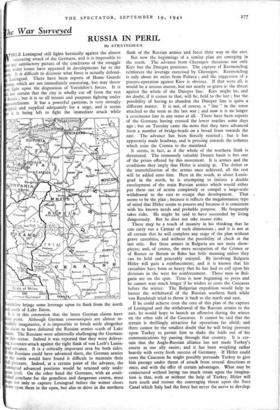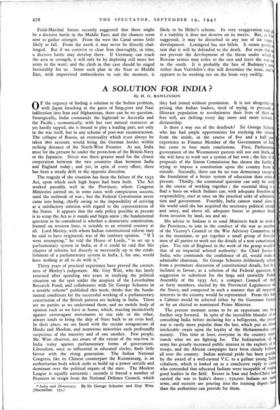RUSSIA IN PERIL
By STRATEGICUS r HILE Leningrad still fights heroically against the almost unceasing attack of the Germans, and it is impossible to in any satisfactory picture of the conditions of the struggle wider issues have appeared in developments far to the th. It is difficult to discover what force is actually defend- Leningrad. There have been reports of Home Guards Wig, which are not immediately reassuring, but may throw light upon the disposition of Vorishilov's forces. It is not certain that the city is wholly cut off from the rest Russia ; but it is to all intents and purposes fighting under e-conditions. It has a powerful garrison, is very strongly ipped and supplied adequately for a siege, and it seems t it is being left to fight the immediate attack while orishilov brings some leverage upon its flank from the north 4 south of Lake Ilmen.
It is in this connexion that the latest German claims have dr point. Although German communiqués are almost in- redibly imaginative, it is impossible to brush aside altogether claim to have defeated the Russian armies south of Lake [linen. The Russians were admittedly challenging the Germans un this sector. Indeed it was reported that they were deliver- ing a counter-attack against the right flank of von Leeb's Lenin- tad advance. It is a critically important area for both sides. the Russians could have advanced there, the German armies to the north would have found it difficult to maintain their full pressure. Indeed, at a certain point of the advance, the Leningrad advanced positions would be retained only under teat peril. On the other hand the Germans, with an estab- shed penchant for the grandiose and dangerous course, must 013e not only to capture Leningrad before the winter closes own upon them in the open, but also to drive in the northern flank of the Russian armies and force their way to the east.
But now the beginnings of a similar plan are emerging in the south. The advance from Chernigov threatens not only Kiev but the Dnieper positions. The capture of Kremenchug reinforces the leverage exercised by Chernigov. Kremenchug is only about 6o miles from Poltava ; and the suggestion of a pincers-operation against Kiev is obvious. If that were all, it would be a serious matter, but not nearly so grave as the threat against the whole of the Dnieper line. Kiev might be, and no doubt, if it comes to that, will be, held to the last ; but the possibility of having to abandon the Dnieper line is quite a different matter. It is not, of course, a " line " in the sense attached to the term in the last war ; and now it is no longer a continuous line in any sense at all. There have been reports of the Germans having crossed the lower reaches some days ago ; but on Tuesday came the news that they have advanced from a number of bridge-heads on a broad front towards the east. The advance has been fiercely resisted ; but it has apparently made headway, and is pressing towards the isthmus which joins the Crimea to the mainland.
It seems, in fact, as if the whole of the southern flank is threatened. The immensely valuable Donetz basin is but one of the prizes- offered by this movement. It is armies and the conditions they imply that Hitler is aiming at. The defeat or the immobilisation of the armies once achieved, all the rest will be added unto him. Here in the south, as about Lenin- grad in the north, he is attempting to initiate a double envelopment of the main Russian armies which would either put them out of action completely or compel a large-scale withdrawal to the east to escape that development. That seems to be the plan ; because it reflects the megalomaniac type of mind that Hitler seems to possess and because it is consistent with his known needs and probable purpose. He frequently takes risks. He might be said to have succeeded by living dangerously. But he does not take insane risks.
There may be a touch of insanity in his thinking that he can carry out a Cannae of such dimensions ; and it is not at all certain that he will complete any stage of the plan without grave casualties, and without the possibility of check at the last stile. But these armies in Bulgaria are not mere show- pieces; and, of course, the mere occupation of the Crimea or of Rostov or Batum or Baku has little meaning unless they can be held and peaceably enjoyed. By involving Bulgaria Hider will gain a reinforcement; and it is known that his casualties have been so heavy that he has had to call upon his divisions in the west for reinforcement. These men in Bul- garia are on the spot. Time is now beginning to press and he cannot wait much longer if he wishes to cross the Caucasus before the winter. The Bulgarian expedition would help to hasten the withdrawal of the Russian southern flank while von Rundstedt tried to throw it hack to the north and east.
If he could achieve even the core of this plan of the capture of Leningrad and the withdrawal of the Russian armies to the east, he would hope to launch an offensive during the winter on the other side of the Caucasus. It cannot be said that the terrain is thrillingly attractive for operations far afield; and there cannot be the smallest doubt that he will bring pressure upon Turkey to permit him to shake the folds out of his communications by passing through that country. It is cer- tain that the Anglo-Russian alliance has not made Turkey's course as our ally easier; and it has been weighing rather heavily with every fresh success of Germany. If Hitler could cross the Caucasus he might possibly persuade Turkey to give him passage under threat of attack from several directions at once, and with the offer of certain advantages. What may be conjectured without laying too much strain upon the imagina- tion is that, with or without the help of Turkey, Hitler will turn south and restore the converging threat upon the Suez Canal which Italy had the force but never the nerve to develop. Field-Marshal Smuts recently suggested that there might be a decisive battle in the Middle East; and the chances seem now to gather strength. From the west the Canal seems little likely to fall. From the north it may never be directly chal- lenged. But if we contrive to clear Iran thoroughly, in time, a decisive battle may develop there. If Germany can reach the area in strength, it will only be by depleting still more her army in the west; and the clash in that case should be staged favourably for us. Some such plan in the Near or Middle East, with improvised embroideries to suit the moment, is likely to be Hitler's scheme. Its very exaggeration may it a viability it does not deserve on its merits. But, as I suggested, it may be disturbed in any one of its stages development. Leningrad has not fallen. It seems pretty taro that it will be defended to the death. But even that not prevent the development of the threat under which Russian armies may retire to the east and leave the way to the south. It is probably the fate of Budenny's a rather than Vorishilov's that will determine the issue, and appears to be working out on the loom very swiftly.



























 Previous page
Previous page